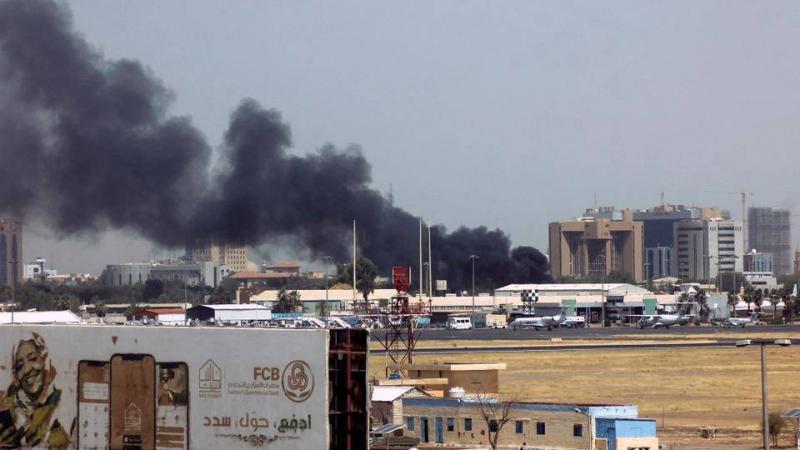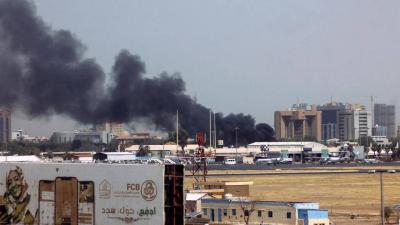Since the beginning of April, Sudan has been going through turbulent times, with the security situation heating up due to significant tensions between the Sudanese army, led by Abdel Fattah al-Burhan, and the "Rapid Support Forces" (RSF), led by Mohamed Hamdan Daglo, over disagreements related to "some pending issues." But what are the details of these disagreements? They have escalated into serious clashes, representing a sudden transformation in their conflict that threatens to ignite a civil war. Earlier, many political and strategic analysts believed that there was no other option for the army and RSF but to reach an agreement and that both sides were seeking to gain as many benefits as possible at the negotiating table, while not being dragged into fighting, especially given the significant international and regional pressures on them.
On the first day of the coup on October 25, which both forces executed against the civilian authority, it seemed that the disagreements between them were growing. RSF commander General Mohammed Hamdan Daglo (known as Hemetti) stated in previous remarks that he discovered "from day one that the coup was carried out to serve as a gateway for the return of the National Congress Party, the regime of ousted President Omar al-Bashir, and it did not achieve a way out of the political impasse." Hemetti apologized for what he considered a "mistake to participate in it." He also continued to publicly criticize the coup's failure to deliver anything substantial after about a year and a half of its implementation, including the formation of an executive government to fill the existing vacuum, in addition to his critiques of the economic situation and deterioration of public services.
When the Sudanese Bar Association proposed a draft transitional constitution in mid-2022, which later formed the basis for political settlement between the coup military and civilians, Hemetti rushed to welcome and support it, while the army hesitated for some time. However, under pressure from international parties and mediation by a quartet committee consisting of the United States, Britain, Saudi Arabia, and the UAE, everyone, including the army, accepted the draft as a basis for discussion.
Subsequently, there was direct and indirect communication between the military and civilians after months of severance following the coup, culminating in the signing of a "preliminary" framework agreement on December 5 between civilians and military, stipulating the formation of a complete civilian government and the separation of the army from politics, in addition to other clauses relating to justice, dismantling Bashir's regime, military and security reforms, and forming one army by integrating the RSF into it. While Hemetti showed support for the framework agreement and the political settlement process, army leaders expressed reservations on multiple occasions, citing what they claimed was "the weakness of its political base and its rejection by some political powers."
Army leaders seized on texts in the framework agreement regarding military and security reform and the integration of armies outside the military system into the national army to push for the integration and disbanding of the RSF. In recent weeks, both sides engaged in a war of words, with the army focusing on the issue of integration while the RSF emphasized demanding that army leaders hand over power to civilians according to what the framework agreement stipulates.
In mid-March, regional and local mediations succeeded in bringing the army and RSF leaders together to sign a new agreement outlining the principles and foundations for military and security reform, allowing for a special workshop on military and security reform to discuss the details of the agreement and prepare recommendations to include in the final agreement in the constitution. This workshop took place from March 26 to 29, during which the RSF presented a paper for making deep reforms in the army before beginning the integration, including criminalizing military coups, criminalizing interference in political work, revising military doctrine and criteria for acceptance in military colleges, ensuring representation of all Sudan's regions in the army, and purging the army of ideological and politicized elements. However, on the final day of the workshop, army representatives withdrew, claiming that the workshop did not address all critical issues, including the timeline for integrating the RSF, before the army later reaffirmed its commitment to the political process and readiness to continue the discussions through technical committees on military and security reform.
As the technical committees reached no conclusions, the signing of the final agreement set for April 1 was postponed, granting civilian parties and international facilitators a second chance for negotiations until April 6 to resolve their differences and sign with others the final agreement to end the political crisis in the country. However, the signing did not take place due to disagreements over the timetable for integrating the RSF into the army.
In this context, the army's spokesperson, Brigadier General Nabil Abdullah, excluded "the final signing of the political process unless clear schedules are set for the integration of the RSF into the army," considering that "integration arrangements must be part of the final agreement as we cannot approve an agreement while there are two armies in the country."
The Sudanese army had warned on Thursday morning in a statement about "the mobilization of forces and opening up within the capital and some cities by the RSF leadership," noting that "such actions constitute a clear violation of the law as those movements occurred without the approval of the armed forces' leadership and without any coordination with it." The statement pointed out that "these openings and repositioning of forces violate the tasks and operating system of the RSF and constitute a clear breach of the law and the directives of central and state security committees, and their continuation will inevitably lead to further divisions and tensions that could result in a breakdown of security in the country." It added: "The armed forces reaffirm their commitment to what was agreed upon in supporting the political transition according to what was stated in the framework agreement, and they warn political forces against the dangers of exploiting the positions of the national armed forces."
Previously, the RSF stated that it was "deploying across the country as part of its normal duties," mentioning that it is spreading and moving throughout the nation to achieve security and stability, combat human trafficking and irregular migration, fight smuggling and drugs, tackle transnational crime, and confront armed robbery gangs wherever they are found.
In the early hours of Saturday morning, mediators indicated in a statement that they had "met with Al-Burhan, who showed readiness to take any steps that would help resolve the urgent issues between the Sudanese armed forces and the RSF and restore matters to their normal course." They reassured "the honorable citizens that the crisis is on its way to being resolved." Army sources told Reuters that "to ease the escalation, the RSF must withdraw its personnel stationed near a military airport in the northern city of Merowe and that its movements should coordinate with the army and remain within the legal boundaries." Meanwhile, sources from the RSF confirmed to Reuters on Friday that "the movements came in coordination with Al-Burhan."
Sources close to Al-Burhan and Daglo revealed on Friday that they remained in disagreement over who would hold the position of commander-in-chief of the army during the integration period, which will last several years. The RSF insists that the commander should be the civilian president of the state, which the army rejects.
Despite both parties confirming their commitment to reducing tensions, clashes erupted between the army and RSF in the Sudanese capital Khartoum early on Saturday, marking a sudden shift in their conflict to an armed confrontation.
Moments after heavy gunfire in Khartoum, the RSF accused the "Sudanese army of launching a massive attack against one of its military bases," stating, "We were surprised by a large force of the armed forces entering our headquarters in Khartoum." The statement indicated that "our forces, which were subjected to a massive attack with all types of heavy and light weapons, were surrounded." The RSF stated, "We have contacted the Quartet mechanism and the mediation group to inform them about the developments. We call on the Sudanese people and the international and regional public opinion to condemn this behavior." Later, the RSF announced its "complete control" over the presidential palace in central Khartoum, Khartoum Airport, and the Merowe and El-Obeid airports in the center of the country. It noted in a statement that "the armed forces attacked simultaneously RSF bases and headquarters in Khartoum, Merowe, and other cities that are still being counted," confirming that "the RSF defended itself and responded to enemy forces, inflicting heavy losses on them." The statement emphasized that "the RSF stands with all citizens and will continue its efforts to protect the gains of the nation and its people's revolution," in reference to the 2019 revolution that ousted Omar al-Bashir after thirty years in power.
As for the Sudanese army, it responded to those events by accusing the RSF of attacking several of its bases. In a statement, it confirmed that "it still controls all bases and airports," and that "its air forces are conducting operations against the RSF." Al-Burhan stated in an interview with Al Jazeera that what happened should prevent the formation of any forces outside the realm of the armed forces, asserting that no one prefers war but that what has occurred should serve as a lesson and warning. Meanwhile, the RSF commander told Al Jazeera that combat operations would end soon, and that his forces are aligned with the choices of the Sudanese people, demanding the army return to its barracks. For its part, Sudan’s General Intelligence pointed out that "the RSF has been declared a rebel force and the public should be vigilant and careful."




